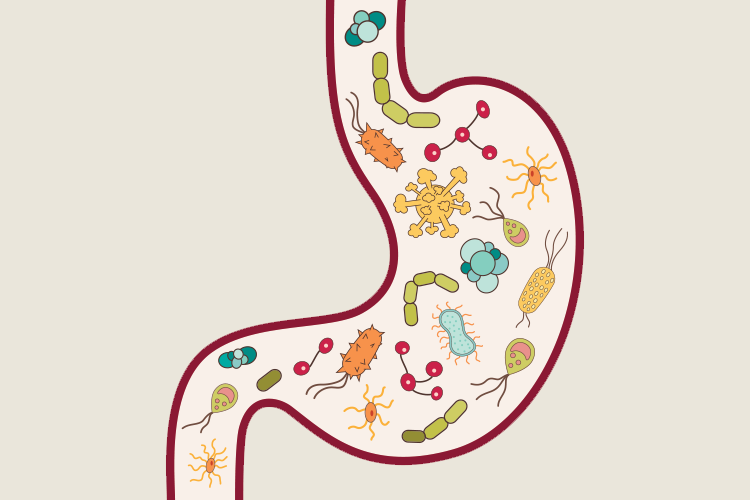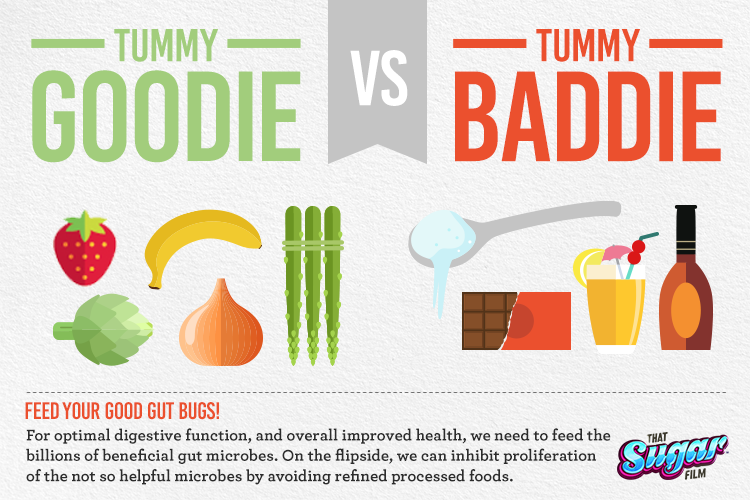Blog
Feeding your gut bugs!
 Our modern-day penchant for a sanitized environment has seen us armed with Ajax, rubber gloves, and a keen determination to cleanse a bench/railing/cheek of all potential nasty bugs.
Our modern-day penchant for a sanitized environment has seen us armed with Ajax, rubber gloves, and a keen determination to cleanse a bench/railing/cheek of all potential nasty bugs.
But are these microbes all bad? The short answer is no.
Love the bugs
While there are some strains that can cause harm, science is fast discovering that our human body is a complex and interconnected ecosystem, with various microorganisms, such as bacteria, working together with our body to keep us functioning.
These microbes – a collection of organisms comprising bacteria, fungi, yeasts, and even viruses – and their genetic material make up the human microbiome. According to recent science, we are comprised of at least the same number of microbes as we are of human cells!
It is believed the diversity and type of microbial populations residing within a human, particularly in the intestinal (a.k.a. the gut) microbiome, can influence a variety of health outcomes, for better or worse.
Gut microbe populations can influence susceptibility to digestive conditions such as ulcerative colitis, Crohn’s disease, celiac disease, and irritable bowel syndrome. These little critters are also connected with systemic conditions such as obesity, depression, type 1 diabetes and type 2 diabetes.(1)
This is not new news! Hippocrates was famous for saying “All disease begins in the gut”. A wise man.
So, what can we do to get the helpful gut microbiota help us? By feeding them!
Feed your gut bugs
To nourish your gut and get the helpful gut bugs to thrive while keeping the unhelpful ones at bay, let’s look at what foods to enjoy and what foods to limit or avoid.
Prebiotic fibre: fuel helpful microbes
Prebiotics are fibre that the human digestive enzymes cannot breakdown. These instead are used as food for the microbes we want to proliferate. Prebiotic fibres include:
- Fructans (including inulin, oligofructose and fructoligosaccaharides)
- Some cellulose and hemicellulose fibres
- Pectins
- Gums
- Polydextrose and polyols
- Resistant starch (including amylose and retrograde starch)
- And to a lesser extent, lignans (2)
Prebiotic-rich foods are listed below. In general, to promote good gut health, ensure you are getting plenty of fibre!
- Vegetables
Jerusalem artichokes, chicory, garlic, onion, leek, shallots, spring onion, asparagus, beetroot, fennel bulb, green peas, snow peas, sweetcorn, savoy cabbage - Legumes
Chickpeas, lentils, red kidney beans, baked beans, soybeans - Fruit
Banana (the less ripe the better), berries, apples, nectarines, white peaches, persimmon, tamarillo, watermelon, grapefruit, pomegranate - Grains & pseudo-grains
Barley, buckwheat, rye bread, rye crackers, gnocchi, couscous, wheat bran, oats - Nuts and seeds
Cashews, pistachio nuts, flaxseeds
Note: when introducing increased quantities of these fibre-rich foods in your diet, do so gradually. The fermentation by these gut bugs may result in increased flatulence. For most, the body should adapt and become more tolerant with time.
Probiotics: support gut health
Boosting intake of fermented foods will get your gut brimming with health. Studies have shown that fermented foods containing various bacterial strains such as Lactobacillus and Bifidobacterium positively impact not only digestive disorders, but also the brain’s processing of emotion and sensation, immune function and allergies, cholesterol levels, blood pressure, and as well as other various chronic and systemic disorders. (3,4)
Food in its fermented form is thought to have enhanced nutrient availability too – a kick-ass food as medicine!
Fermented foods to consider including in your every day are:
- Sauerkraut and other fermented vegetables
- Kimchi
- Plain yoghurt with live cultures (and without added sugars)
- Kefir
- Kombucha tea
- Miso and tempeh (non-genetically modified and organic)
Foods to limit or avoid
The nasty gut bug populations THRIVE on refined and added sugars, which can lead to a leaky gut, digestive issues like bloating and IBS, mood dysfunction, weight gain, inflammation, and conditions like thrush.
To help keep the unhelpful gut bugs at bay, consider:
- Limiting intake of added and free sugars
- Limiting intake of processed, refined, deep-fried, smoked and artificial food and beverages
- Limiting alcohol and stimulants
- Avoiding genetically modified foods
- Avoiding antibiotic-treated foods
Feed your gut!
A healthy microbiome means effective absorption and utilisation of nutrients from our food and drink. What we want is to feed the good existing gut bugs the prebiotic goodies, and replenish the stores with probiotic-rich fermented foods, to create our own happy, healthy ecosystem for a happy, healthy life!
By Angela Johnson (BHSc Nut. Med.)
References
- Brown, K, DeCoffe, D, Molcan, E & Gibson, DL 2012, ‘Diet-induced dysbiosis of the intestinal microbiota and the effects on immunity and disease.’, Nutrients, vol. 4, no. 8, pp. 1095–119
- Gropper, S & Smith, J 2013, Advanced Nutrition and Human Metabolism, 6th edn, Wadsworth Cengage Learning, Belmont, CA
- Kechagia, M Basoulis, D SKonstantopoulou, S Dimitriadi, D Gyftopoulou, K Skarmoutsou, K and Fakiri, EM 2013, Health Benefits of Probiotics: A Review, ISRN Nutrition, vol. 2013, Article ID 481651
- Tillisch K, Labus J, Kilpatrick L, Jiang Z, Stains J, Ebrat B, Guyonnet D, Legrain-Raspaud S, Trotin B, Naliboff B, & Mayer EA 2013, Consumption of fermented milk product with probiotic modulates brain activity, Gastroenterology, no. 144, no. 7, pp. 1394-1401












